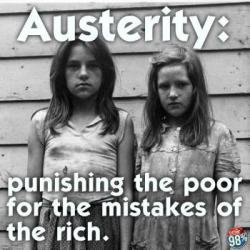From Lars Syll One may perhaps, distinguish between obscure writers and obscurantist writers. The former aim at truth, but do not respect the norms for arriving at truth, such as focusing on causality, acting as the Devil’s Advocate, and generating falsifiable hypotheses. The latter do not aim at truth, and often scorn the very idea that there is such a thing as the truth … The authors I have singled out are far from marginal, and in fact are at the core of the profession. Their numerous awards testify to this fact. These writings have in common a somewhat uncanny combination of mathematical sophistication on the one hand and conceptual naiveté and empirical sloppiness on the other. The mathematics, which could have been a tool, is little more than toy. The steam engine was invented by
Topics:
Lars Pålsson Syll considers the following as important: Uncategorized
This could be interesting, too:
tom writes The Ukraine war and Europe’s deepening march of folly
Stavros Mavroudeas writes CfP of Marxist Macroeconomic Modelling workgroup – 18th WAPE Forum, Istanbul August 6-8, 2025
Lars Pålsson Syll writes The pretence-of-knowledge syndrome
Dean Baker writes Crypto and Donald Trump’s strategic baseball card reserve
from Lars Syll
One may perhaps, distinguish between obscure writers and obscurantist writers. The former aim at truth, but do not respect the norms for arriving at truth, such as focusing on causality, acting as the Devil’s Advocate, and generating falsifiable hypotheses. The latter do not aim at truth, and often scorn the very idea that there is such a thing as the truth …
The authors I have singled out are far from marginal, and in fact are at the core of the profession. Their numerous awards testify to this fact.
These writings have in common a somewhat uncanny combination of mathematical sophistication on the one hand and conceptual naiveté and empirical sloppiness on the other. The mathematics, which could have been a tool, is little more than toy. The steam engine was invented by Hero of Alexandria in the first century A. D., but he considered it mainly as a toy, not as a tool that could be put to productive use. He did apparently use it, though, for opening temple doors, so his engine wasn’t completely idling. Hard obscurantist models, too, may have some value as tools, but mostly they are toys.
I have pointed to the following objectionable practices:
2. Adopting huge simplifications that make the empirical relevance of the results essentially nil …
3. Assuming that the probabilities in a stochastic process are known to the agents … or even in some sense optimal …
7. Assuming that agents can choose optimal preferences …
11. Adhering to the instrumental Chicago-style philosophy of explanation, which emphasizes as-if rationality and denies that the realism of assumptions is a relevant issue.
It’s hard not to agree with Elster’s critique of mainstream economics and its practice of letting models and procedures become ends in themselves, without considerations of their lack of explanatory value as regards real-world phenomena. For more on modern mainstream economics and this kind of wilfully silly obscurantism, yours truly self-indulgently recommend reading this article on RBC or this article on mainstream axiomatics.
Many mainstream economists working in the field of economic theory think that their task is to give us analytical truths. That is great — from a mathematical and formal logical point of view. In science, however, it is rather uninteresting and totally uninformative! The framework of the analysis is too narrow. Even if economic theory gives us ‘logical’ truths, that is not what we are looking for as scientists. We are interested in finding truths that give us new information and knowledge of the world in which we live.
Scientific theories are theories that ‘refer’ to the real-world, where axioms and definitions do not take us very far. To be of interest for an economist or social scientist that wants to understand, explain, or predict real-world phenomena, the pure theory has to be ‘interpreted’ — it has to be ‘applied’ theory. An economic theory that does not go beyond proving theorems and conditional ‘if-then’ statements — and do not make assertions and put forward hypotheses about real-world individuals and institutions — is of little consequence for anyone wanting to use theories to better understand, explain or predict real-world phenomena.
Mainstream theoretical economics has no empirical content whatsoever. And it certainly has no relevance whatsoever to a scientific endeavour of expanding real-world knowledge. This should come as no surprise. Building theories and models on unjustified patently ridiculous assumptions we know people never conform to, does not deliver real science. Real and reasonable people have no reason to believe in ‘as-if’ models of ‘rational’ robot-imitations acting and deciding in a Walt Disney-world characterised by ‘common knowledge,’ ‘full information,’ ‘rational expectations,’ zero transaction costs, given stochastic probability distributions, risk-reduced genuine uncertainty, and other laughable nonsense assumptions of the same ilk.
 For decades now, economics students have been complaining about the way economics is taught. Their complaints are justified. Force-feeding young and open-minded people with unverified and useless autistic mainstream neoclassical theories and models cannot be the right way to develop a relevant and realistic economic science.
For decades now, economics students have been complaining about the way economics is taught. Their complaints are justified. Force-feeding young and open-minded people with unverified and useless autistic mainstream neoclassical theories and models cannot be the right way to develop a relevant and realistic economic science.
Much work done in mainstream theoretical economics is devoid of any explanatory interest. And not only that. Seen from a strictly scientific point of view, it has no value at all. It is a waste of time. And as so many have been experiencing in modern times of austerity policies and market fundamentalism — a very harmful waste of time.
